How Does Cloud-Based Calling Software Drive Productivity?
What Cloud-Based Calling Software Can Do For Your Business?
Efficient inbound and outbound communication is necessary for a business to enhance the efficiency of its customer service operations and grow. Traditional phone systems contain wired systems that limit business communication to a physical location. The arrival of cloud technologies in the last decade has revolutionised every industry including call centres leading to enhanced performance in day-to-day operations. Cloud-Based Calling Software allows your in-house and virtual agents to communicate with existing and potential customers over the Internet to boost sales and conversion. Let’s delve deep into the benefits of cloud calling for your business.
What is Cloud-Based Calling Software?
Cloud calling allows your sales and marketing teams to communicate with prospects and customers through the Internet wherever, and whenever needed. Companies can also choose external cloud-hosted services to improve customer experience, retention and satisfaction. Today, almost 62% of businesses have moved to cloud-based call centres and the rate is still increasing to enhance operational efficiency across organisations. Moreover, cloud software is easier to deploy, implement or install than on-premises systems. It provides real-time insights into customer data and the latest collaboration tools for your teams to boost productivity and growth.
Navigating to Different Types of Cloud Call Centres
- Public Cloud: This cloud call centre is available to the general public on the internet with fast deployment and access options. They are scalable, flexible and location-independent solutions. However, the security of your business and customer data is a matter of concern in the public cloud.
- Private Cloud: They address various security concerns of companies and give them better control of their business data. A private cloud reduces the risk of data loss and allows you to manage the system internally or by hiring a reliable service provider.
- Hybrid Cloud: It facilitates companies to use the features and functionalities of both public and private cloud. For instance, they can store less sensitive information in the public cloud and sensitive data in a private cloud. A hybrid cloud is an efficient, scalable and cost-efficient solution for businesses.
Things to Consider Before Choosing A Cloud System
- Data Security: Business data privacy and security are important issues of many service-oriented businesses including the banking and finance sectors. This is why you should choose a cloud call centre system that ensures the privacy of your private information.
- The challenge of Upgrading from an On-Premises System: On-premises call centre solutions give enterprises complete control over their business infrastructure. Likewise, they offer more customisation options for data security and business needs. This is why it is challenging to transition from on-premises solution to the cloud.
- Support Integrations: Cloud call centres are the best choice for companies because they offer easier integrations across various communication channels to deliver a seamless customer service experience. Your customers can reach your business in their preferred communication channels and your teams can seamlessly interact with them ensuring first call resolution rate. You should choose a system that supports countless integrations.
How Cloud Calling System Is the Best Choice For Your Business?
1. Easy to Deploy & Implement
Companies can easily install and implement cloud-calling systems to communicate with customers. Meanwhile, the use of chatbots and IVR technology can help your agents manage high call volume and enable them to focus on important tasks. Moreover, your virtual agents can assist and support round the clock through voice and chat channels.
2. Cost Efficient & Affordable Option
Cloud call centre systems need minimal upfront costs than traditional on-premises systems. Businesses can run their setup without purchasing expensive hardware as cloud service providers provide you with the necessary equipment eliminating the need for other investments. Your remote teams can work from any location through an internet-connected device saving money on costly hardware and office space. Your cloud service provider is responsible for maintenance so it is an affordable option for companies.
3. Better Customer Service
The quality of support services you provide your customers determines your business success. A cloud call centre is designed to provide a delightful customer service experience to your customers across all communication channels. Moreover, the more positively you communicate with your customers, the more likely they‘ll refer your brand to others increasing revenue, loyalty and satisfaction. IVR, call routing and CRM features in the cloud calling software reduce customer wait time, and improve agent efficiency and overall customer experience.
4. Adaptability & Scalability
Another benefit of a cloud-based call centre system is that it evolves and grows with your fluctuating business needs. You can easily manage a high volume of incoming calls in peak seasons. Likewise, you can employ a global talent pool to provide superior customer service. They can manage incoming and outgoing calls from anywhere while companies can monitor their performance.
Additional Benefits of Cloud Call Centre Solutions
5. Access to Global Customers
Cloud solutions are becoming increasingly important for global enterprises. They allow your teams to reach customers anywhere without needing a physical office or installing complex software. Companies can establish their regional presence through cloud calling and provide top-notch customer service experience.
6. Improves Team Performance
Understanding customer perspectives and preferences is necessary to offer an excellent customer service experience. For this reason, all your departments and teams should be on the same page about customer service. Cloud Call centre software can integrate with various business tools so your teams can access the latest customer information and run personalised campaigns. The software also contains monitoring and tracking features to help organisations analyse coaching and training needs.
7. Ensure Business Continuity
Cloud solutions are more efficient than on-premises solutions because later ones are prone to hardware failure that can lead to downtimes. All your call centre teams, administrators, agents and supervisors can access the cloud system from anywhere regardless of physical location through an internet-connected device. This way you can continue your services even during disasters and emergencies.
Final Note: What’s Next?
Finally, the benefits of Cloud-Based Calling Software that enhance your business communication and productivity are undeniable. Hence, companies with distributed teams, remote workers and multiple office locations can leverage the technology to reduce operational expenses, automate manual processes and deliver superior customer service experience. This system is designed to facilitate digital customers with ease. However, it can be difficult for companies to make the right choice. Specialised cloud service providers can help choosing the right cloud software for your business. Contact CherryBerry UCM to get the technology to help your team thrive.
Reduce Operational Expenses with Virtual Call Center Software
Overview of Virtual Call Center Software
Today, multichannel communication has become a necessity for modern businesses to ensure the provision of exceptional customer service to keep them satisfied. Virtual Call Center Software is one of the technological advancements which they can use to centralize information from different communication platforms in one place. However, this software offers many functionalities or features like auto-dialers, IVR technology, computer telephony integration (CTI), ACD and a lot more. Businesses need to understand the distinct functions and features before investing in the software. You should choose the one that is best for your company and help you in achieving your business goals of handling customer interactions. Virtual software allows agents to manage customer inquiries, support tasks and issues from anywhere to enhance customer satisfaction.
Categories of Call Center System
The main purpose of virtual software for call centers is to help companies manage their customer communication coming from multiple sources and channels efficiently. Based on system utilization and communication processing, this software falls into two categories:
1. On-Premises Systems
The on-premises call center systems are installed and operated from servers kept in the physical infrastructure of a business. The business itself hosts the software in their own servers and data centers that offer a high level of control, security and customization. These systems also require hardware and equipment that needs high investment.
2. Cloud Call Center Systems
Nowadays, cloud call center systems are gaining popularity in the market for being reliable, flexible and scalable. The facility of cloud technology allows companies to access all the features from anywhere, anytime without complex or heavy installations. This type of call center system is the most affordable and cost-effective solution for companies having tighter budgets or looking for remote working.
Top Features of Virtual Call Center System
1. Cloud Technology
Virtual Call Center Software operates on a cloud technology that empowers your agents to access it remotely and use all the functionalities. This eliminates the need for physical infrastructure and provides flexibility and scalability for all types of businesses.
2. Multichannel Communication
Today’s tech-savvy customers expect to communicate with a business through their desired communication channels. Virtual software supports traditional voice calls, emails, live chat, social media, and more. This multichannel facility allows businesses to communicate with their customers in their preferred mode of communication.
3. IVR Technology
Through this technology, customers interact with automated menus following digital recipient commands or the system directs their call to the appropriate agent. IVR systems sometimes also collect customer information before routing calls to agents. It streamlines the call process and enhances your call center efficiency.
4. Automatic Call Distribution
This feature has the potential to route incoming customer calls to the most appropriate agent based on predefined criteria like agent skills, availability, or call priority. ACD reduces wait times, enhances overall customer service experience and ensures customer satisfaction.
5. Auto Dialers
Auto dialers can predict agent availability, initiate multiple calls automatically at once and also provide an overview of caller information. This feature reduces the idle time of your agents and enhances their efficiency at work.
6. Call Monitoring & Analytics
Call center systems allow call center administration to monitor customer calls in real time, ensuring quality control and exploring training opportunities. The valuable insights about call metrics, agent performance, and customer satisfaction further help in decision-making.
Conclusion
Indeed, Virtual Call Center Software is a worthwhile investment for companies looking for ways to reduce operational expenses. It contains many useful features like auto-dialers and call tracking to assist your agents and enhance their productivity. Consult CherryBerry UCM experts to enhance the efficiency of your remote teams and promote collaborative work environments.
Benefits of Omni Channel Call Center Software
What is Omni Channel Call Center Software?
Nowadays, Omni Channel Call Center Software has emerged as a popular technology due to the unmatched level of support experience they provide to the customers. This technology has enhanced capabilities that enable your support team to understand their customer needs and positively influence customer service by making your customers loyal and happier to your business. Omnichannel call centers use cloud-based software to handle customer interaction across various communication channels including phone calls, email, SMS, chat and social media. To achieve the purpose of ensuring a seamless customer journey, instant and efficient communication is essential and omnichannel software helps you with it. Omnichannel customer service empowers your customers to interact with your business effortlessly and get timely and personalized assistance. Let’s learn more about the potential of this technology to grow your business.
Significant Elements of Omnichannel Call Center
1. Integration Capabilities
An omnichannel call service offers seamless integration capabilities with various support channels to ensure the provision of consistent customer support. To make such integration possible, companies can invest in relevant software and platforms. This way, they can enable real-time data synchronization across various channels without manual interruption.
2. Centralized Data Management
This component helps to create a detailed customer profile by acquiring data across different communication channels. It further empowers your agents to deliver personalized interaction and support. Moreover, the data management strategy of companies should focus on keeping their customer data secure. The immediate access to customer data is key to ensuring the best possible customer service.
3. Unified Routing
It is important to collect your customer messages from different communication channels and consolidate them into a single platform. Likewise, it is also essential to assign them to your agents in a simplified way. The unified routing feature enables you to manage your support tickets effectively by assigning them to agents keeping in view region, channel and query type.
4. Performance Analysis
With the help of data analytics tools, companies can get valuable insights about their customer interactions. They can analyze their agent performance and the quality of overall contact center operations. This data further helps to identify areas that need improvement. It allows call center agents to take data-backed decisions to provide enhanced customer experience. Sentiment detection can help identify the tone of your customer messages to determine whether they are satisfied or not satisfied with your services.
Key Advantages of Omnichannel Call Centers
The main aim of every business is to deliver top-notch customer service. To achieve this feat, the implementation of an effective omnichannel strategy possesses great importance. Let’s take a look at how these call centers can take your business to new heights.
1. Enable You to Deliver Exceptional Customer Support
When call centers have all the information related to every conversation across various channels about a customer, they can easily understand their customers’ needs and preferences in advance. This way, they can ensure a great support experience by quick resolution of issues. With constant good experience, you can turn your satisfied customers into your brand advocates.
2. Enhance Your Agent Efficiency & Productivity
Omnichannel call centers not only keep your customer satisfied but also make your agents productive. Omni Channel Call Center Software has made the job of your customer service agents easier by consolidating info into a centralized and single platform. Having access to a single unified platform allows agents to manage multiple conversations efficiently. It also reduces idle time as they can get the required info without switching between multiple solutions. Moreover, the routing mechanism distributes inbound calls determining agent skills, load and availability.
3. Keep Your Customer Engaged
Omnichannel call centers provide a variety of communication channels for your customers to contact your business. Consequently, this boosts conversion rate and engagement. Your agents can spend more time interacting with customers. Customers expect a service to address their issues timely so they can reach out to a service anytime. Omni Channel Call Center Software provides multiple communication channels for customers to keep them engaged with your service all the time.
4. Monitoring Improves Quality of Services
The record of previous interactions helps businesses analyze their performance and pinpoint areas that need improvement. The insights of real-time metrics like average handling time and customer satisfaction level also help to determine each agent’s performance. In this way, call centers can find top-performing agents and conduct target coaching. The enhanced agent performance will ultimately improve customer experience.
Bottom Line
Omni Channel Call Center Software integrates multiple communication channels like phone calls, emails, live chat, social media, and more into a single unified platform. This further ensures that customers receive consistent and quality services, regardless of the type of channel they choose to communicate. In this way, companies can enhance the overall customer experience. If you are considering switching to an omnichannel call center, do it in the most efficient way with the help of CherryBerry UCM.
An In-Depth Look at Cloud-Based Call Centre Solution
An Overview of Cloud-Based Call Centre Solution
Customer service is an important factor that influences everything from consumer purchasing decisions to brand loyalty. Companies can provide top-notch customer service with the help of a simple way of communication like Cloud-Based Call Centre Solution. You may consider a call center a place with a traditional setup wherein call distributors disperse customer calls to the agents but modern call centers look a lot different than this concept. The latest call centers are equipped with virtual customer service that not only helps to reduce costs but also increases reliability while offering better customer service at every turn. A cloud call center is a web-based software designed to manage inbound and outbound communication of customers with a business. Being based in the cloud, it can be accessed anytime, anywhere providing companies with the flexibility to employ virtual agents from the talent pool at the global level and scale their workforce accordingly.
Why are Cloud Call Centers Important?
They contain core technologies like an interactive voice response (IVR) system, and automatic call distributor (ACD). However, they are not limited to voice calls only and provide a wide range of communication channels like live chat, SMS, email and social media. Cloud software also has workforce optimization capabilities that help to manage your staff while reporting tools enable companies to highlight opportunities for business growth. Agents can access legacy systems from on-site location only but cloud-based software has no such restrictions. You and your team can access this technology anywhere through an internet-connected device. Meanwhile, your agents can provide seamless service across multiple communication channels by taking advantage of all-in-one dashboards. Equipped with the right information at the right time, they can manage resolutions faster and provide personalized interactions to keep customers satisfied. By replacing legacy systems with cloud technology, you can reduce costs and improve service levels.
Benefits of Cloud Software for Call Centers
1. Improves Customer Service
Now agents no longer need to switch between multiple applications to get required data as it automatically displays in front of them with each call. Meanwhile, speech analytics and sentiment analysis also guide your agents about the next step for each customer. This way, they can provide the level of personalization customers expect from your service. Moreover, your customers can self-resolve simple issues quickly with intelligent IVR technology.
2. Allow to Add more Communication Channels
In case your call center is only managing voice interactions, you might need to make an effort to jump straight into other communication channels like live chat or SMS. With the help of a cloud-based call centre solution, you can easily turn into additional communication channels with evolving business needs without making immense infrastructure changes.
3. Reduces Huge Overhead Costs
Making updates in legacy call centres is a labour-intensive and time-consuming task. Moreover, the process also requires the skills of costly IT specialists and experts. However, this is not the case with cloud-based systems. You don’t have to pay huge overhead costs and you can easily meet your changing needs as business evolves.
4. Offers Opportunity for Global Reach
The cloud solution does not limit communication with geographical boundaries. They allow your remote team to communicate across different time zones. This way, call centers can have sales reps all over the globe to respond to customer needs round-the-clock. They can also scale their agents according to growing customer demands.
Important Features of Cloud Software
1. The call routing feature allows the routing of customer calls to the most appropriate agent of your call center. It increases your agent efficiency and reduces wait times.
2. Automatic call distribution (ACD) empowers call centres to distribute incoming customer calls evenly among call center agents to reduce their burden and increase the call resolution rate.
3. Through the Caller ID feature, call center agents can identify their callers by visiting their contact information. It ensures personalized interactions among agents and customers.
4. Businesses can track the performance of their agents and call centers through reporting and analytics. They can use these insights to make informed decisions.
5. Integration of cloud-based software with other software like customer relationship management increases the efficiency of your agents.
Industry Use Cases of Cloud Solutions
1. Customer Support Services
Cloud-based call center software allows businesses to offer highly scalable and adaptable customer service to meet their dynamic needs. At present, companies are no longer required to invest in costly infrastructure as in the case with on-premises systems. Instead, they can easily integrate important tools and applications to meet their growing business and customer demands. This flexibility reduces the overall operational costs and businesses can allocate resources according to their customer support needs.
2. Real-Time Reporting & Analytics
The insights of various aspects of customer service performance allow businesses to highlight areas that need improvement. They can also measure the outcomes of implemented changes and make data-driven strategic decisions. Businesses can monitor key performance indicators like first contact resolution rate, waiting times and agent productivity to evaluate overall performance.
3. Workforce Management Services
Cloud software provides appropriate tools and resources to your agents so they can efficiently manage their customer queries. For instance, the automatic call distribution feature ensures the distribution of customer calls to the most relevant agents. Moreover, call center supervisors can create automated schedules for agents, monitor the real-time performance of agents and explore training opportunities. This, ultimately, leads to enhanced agent performance and customer satisfaction.
4. Virtual Call Center Services
Businesses can manage a geographically distributed workforce efficiently through a cloud-based call centre solution. They can employ experienced agents from a larger talent pool regardless of geographical boundaries. This reduces physical infrastructure costs, enhances agent flexibility and offers 24/7 services. Cloud-based software also ensures that your remote agents have access to similar tools and applications as on-premises agents.
Final Thoughts
Today, businesses are investing heavily in a cloud-based call centre solution to streamline their customer support operations. Access to the latest technologies like machine learning, artificial intelligence and real-time analytics allows cloud call centers to increase their teams’ efficiency, provide better customer experience and grow their business. If you are considering moving from a legacy system to a cloud-based system, contact CherryBerry UCM experts and achieve long-lasting success in the digital age.
Meet Dynamic Business Needs with Cloud Call Center Services
Importance of Cloud Call Center Services
What comes to your mind after listening to the term call center? Maybe an image of a place full of agents with headsets busy managing customer calls, right? This traditional concept has been there for a long time but traditional call centers were different from the latest call centers in terms of on-site accessibility. However, with the evolution of technology, new trends emerged that allow agents to work remotely by taking the benefit from cloud-based call center software and enable businesses to adapt to multiple communication channels to meet their dynamic customers’ needs. A cloud-based call center makes all the tools and technology needed to run a call center available for businesses over the Internet eliminating the necessity of on-site hardware and costly infrastructure by offering easy-to-maintain and flexible solutions. Businesses can offer better customer support through Cloud Call Center Services. Let’s explore the important benefits of leveraging cloud technology.
1. Enhances Customer Service Experience
Although there are countless benefits of cloud-based contact centers, the most important one is that it improves your customer experience. Long hold times can lead to a negative customer service experience while endless IVR menus can also make your customer frustrated. All these factors directly influence your business’s bottom line, as impersonal experience is also one of the major reasons to abandon a brand. Moreover, the constraints of traditional call centers make it highly difficult for companies to keep up with the dynamic customer demands. All these issues contribute to negative interactions but cloud-based call center software enables your agents to offer a top-notch customer experience.
2. Provides Scalability & Flexibility
With business growth, your customers and call center needs also evolve. A cloud-based call center offers you the agility needed to scale your business call-related operations. This technology allows you to add new communication channels to your existing call center and control creating customer experience. Moreover, companies can collect customer feedback, track call center insights and get information about evolving customer needs. Companies that depend on complex legacy systems do not have the freedom to iterate or make changes quickly. While working with specialized Cloud Call Center Services, they can track important metrics and use these insights to enhance the quality of the services.
3. Improves Agent Efficiency
As cloud-based solutions are easy to set up, they increase your agent productivity by allowing them to provide services virtually. In this way, companies can provide round-the-clock customer services to resolve their issues with greater precision. Interactive voice response technology, automatic call distribution, call routing and call priority features also increase your agent’s productivity and save their time. Administration can access the conversation record for quality assurance and training purposes.
4. Reduces Costs & Allows Call Routing
Cloud-based call centers are highly cost-efficient because they reduce upfront costs. Call centers can integrate this technology with other business applications to enhance efficiency and productivity. Moreover, connecting the callers to the right agents as quickly as possible is important. Call centers can benefit from intelligent routing features of cloud call center software to make this possible. Intelligent routing not only increases your agent’s productivity but also enables them to focus on the right task at the right time.
Final Words
Transitioning to Cloud Call Center Services can elevate your customer service and give you control over costs and customer satisfaction. However, selecting the right options in a pool of available options is a challenging task. Here, Cherry Berry UCM can help you achieve all your goals of providing a superior customer service experience. Contact our experts today to take your company to the next level.
Top Features & Benefits of Cloud-Based Call Center
On-Premise vs. Cloud-Based Call Center: What’s the Difference
A Cloud-Based Call Center primarily works like a traditional call center e.g. handling incoming and outgoing communication with customers. An on-site call center means that you should have all important physical hardware housed in your company. Moreover, installation and maintenance is your responsibility with phones and computers that are hardwired with a centralized system, generally a Private Branch Exchange (PBX) system. In on-premises call centers, companies can only benefit from basic telephony features. Conversely, a cloud-based technology does not need telecom equipment or in-house storage. You can collaborate with a service provider to get the cloud facility while your sales team can access the system from anywhere through the internet connection. This facility allows you to add new users easily without any physical installation. Briefly, cloud contact centers operate over the internet more than physical servers and phone lines.
Top Features of Cloud Contact Center
1. Virtual Assistant
This automated voice technology serves as a virtual assistant and helps manage basic interactions. For instance, you can manage many things without human involvement through IVR like outbound reminders and customer requests for account balance inquiries. IVR technology can also direct callers to the right agent.
2. Automatic Call Distributor (ACD)
It automates the process of call routing and transfers customers to the most suitable agent. These features allow you to set up rules to route calls based on your agent’s performance, skill and idle time. ACD can route calls analyzing their past interactions.
3. Call Recording
This feature enables you to monitor your agent performance and customer satisfaction level. Administration can access the recording of calls for issue resolution, training purposes or quality assurance. Through this insight, they can make data-driven decisions.
4. Auto Dialer Technology
It reduces the chances of errors and also reduces time between calls empowering your outbound agents to place more calls during their daily routine. In this way, your customers can spend more time talking with customers to keep them satisfied and happy.
5. Real-Time Analytics
This feature allows call centers to measure different metrics such as average response time and customers’ emotions. Call analytics is also helpful to see trends and preferences as well as for training purposes.
How It is Beneficial For Your Business?
1. Requires Low Maintenance
Legacy systems require high maintenance besides high infrastructure costs. Moreover, they quickly become outdated so they need frequent upgrades and special IT teams for maintenance. However, cloud-based systems do not have such worries as your service provider manages updates and maintenance.
2. User-Friendly & Scalable
Cloud call centers do not need a highly experienced IT team or hardware so you can save on up-front costs. These solutions are also user-friendly so your agents require minimal training. Additionally, you can add or remove users based on workload which makes it highly scalable. You can also integrate tools according to your needs and can access the systems from anywhere.
3. Unified Communications
A cloud-based Call Center is worth investing in because it allows you to add features and technology to manage all types of digital communication. It means that you no longer need to restrict your customers on phone calls. You can provide them with multiple communication channels to make things easy for them. With unified communication, companies can access their customer interaction in one place and can switch between channels to enhance productivity.
Conclusion
A Cloud-Based Call Center is a scalable, user-friendly and cost-effective solution in comparison with on-premises systems. With the help of this technology, businesses can also integrate other business tools to ensure seamless interaction. Take Cherry Berry UCM expert’s help to streamline your call center operations.
Exploring Significant Features of Call Center Management Software
What is Call Center Management Software?
Smart companies always focus on applying strategies that can eliminate costs and enhance efficiency. Investing in call center software is one such effective way and cost-effective approach to manage customer communication across organizations and various communication channels efficiently. Focusing on call-related processes is important because communication over the phone is more difficult than social media interaction, SMS or email due to direct interaction with customers. Agents have the responsibility to provide the right answers to customer queries without any pause or losing focus. Thus, with Call Center Management Software, companies can streamline their inbound and outbound call center processes and can offer superior customer support. This software enables your agents to meet customer expectations with minimal effort. It automates the flow of incoming and outgoing calls to enhance agent efficiency and call center performance. Let’s learn more about the features of this software.
Important Features of Call Center Management Software
Before moving ahead to invest in call center technology, it is essential to consider why your business needs call center software. You should know how this software will help your calling team in resolving their issues. Here is the list of essential features which most of the companies want to have in this software.
1. Automatic Call Routing
A contact center software automated the process of both inbound and outbound calls. Call centers can use IVR or interactive voice response systems to present menu options, and create greetings and answers to frequently asked queries to resolve customer issues electronically. An IVR technology also connects the customers calling for support to the most relevant agent at the push of a button. Likewise, your customers can also access simple information like business closing hours or address details without talking to the agent. This helps your agents to manage complex inquiries and reduces call wait time.
2. Integration with CRM Technology
Besides the IVR system, the Call Center Management Software can also be integrated with your sales and marketing CRM software to maximize efficiency. This integration empowers companies to forward their calls, get detailed information about the customer on call and prioritize calls based on their importance. It ensures that your agents remain proactive while calling prospects to provide personalized services. As this technology provides you with all the information you need about your customers, your agent efficiency increases as a sales agent.
3. Automated Call Distribution
Your agents can be busy with leads and customers when any other customer places a call in your call centers. The automated call distribution feature ensures the routing of calls to only relevant and available agents instead of queuing other busy agents. Additionally, companies can also preset call distribution considering different parameters like time and location of call.
What Else to Expect?
4. Auto-Recording
Companies want to know the quality of their calls and the way agents handle customers on calls. Listening to the conversation is the only way to achieve this feat. This need has prompted call centers to record both inbound and outbound calls, a significant feature of today’s call centers. With auto-recording features, call center administration can measure their agents and call center performance and can take the right course of action to ensure quality services. This feature is also important for training and coaching purposes.
5. SMS Tracking & Voice or Email Transcription
Sometimes, messages get lost in communication on calls. However, companies can utilize the potential of an SMS tracking feature to monitor messages sent to or received from prospects or leads. They can also figure out some messages that can be converted into automatic scripts so the company can send them to customers in case customers are not able to receive calls. Call center software also enables agents to get the transcript of calls and online chats. This facility further helps in quality control and customer engagement.
6. Real-Time Analytics & Reporting
Call centers use multiple communication channels to communicate with customers. With real-time reporting features, administration can get detailed reports of their call center performance and agents. They can get information about the number of calls made or received, call duration and their quality. This insight helps businesses to make date-backed decisions and fix general issues with their call center team of agents.
7. Flexibility & Versatility
Contact center software provides flexibility when your team works from remote locations of the virtual call center. This is because it does not need a complex setup, costly hardware or wide office space. Moreover, call center software keeps the ability to adapt to any industry ranging from real estate to education and insurance. Call centers can use this technology to streamline telemarketing, sales, support and more processes.
Which Call Center Type is Best For Your Business?
Investing in contact center software is indeed a big deal. Thus, before moving ahead to invest in the solution that fits best for your business, you should know the difference between cloud-based and on-premises call centers.
1. On-Premises Software
Legacy, traditional or on-premises software needs in-house servers to operate while companies keep these servers in physical locations. Moreover, experts manually manage IT updates and maintenance on-site. Shortly, companies have full control over on-site contact center software. They utilize local phone lines instead of internet connection to manage inbound and outbound calls. Landlines offer better phone call quality than cloud-based software and do not need a stable internet connection to work. This software is a good solution for those companies looking to get full control over their software or want to ensure the security of their customer information.
2. Cloud-Based Call Center Solution
They are more flexible, cheaper and scalable solutions that serve as an alternative to on-premises software. Furthermore, this software is a good choice for companies working remotely or have tighter budgets. Companies do not need physical space for keeping in-house servers or other hardware as the cloud stores all the data. They don’t have to pay the maintenance costs required in on-premises software. As cloud-based systems do not need a physical location, companies can employ their agents anywhere around the globe. They can also appoint agents other than their time zones to provide round-the-clock support.
Final Thoughts
Call center management is a process of managing routine call center operations like incoming and outgoing calls. These operations range from scheduling appointments, employee training, reporting and managing customer interaction during incoming and outgoing calls. The right Call Center Management Software gives you control over leads and allows you to offer enhanced customer experience. Cherry Berry UCM can assist you in achieving your dream of managing your incoming and outgoing calls efficiently. Call us today to meet our experts and take your business to the next level.
Enhance Business Value With Cloud-Based Call Center Software
Why Companies Need Cloud-Based Call Center Software?
Nowadays, most businesses are considering moving their call center services to the cloud to meet their customers’ dynamic expectations, stay higher in the competitive curve and offer exceptional customer service experience. Traditional call centers consisted of heavy and costly hardware and came with some restrictions regarding customers’ communication channels. However, the latest Cloud-Based Call Center Software offers flexibility, on-demand scalability, and cost optimisation and also reduces the need for physical infrastructure. The administration and team can remotely access all data from anywhere and ensure omnichannel communication. Businesses can keep their all teams on one page with the help of this technology. The advantage of low infrastructure cost has made this technology the first choice of the majority of small and medium enterprises. It helps businesses to maintain their market supremacy through cloud-based technology.
Important Features of Call Center System
1. Live Call Monitoring
This feature enables the administration to record, store and analyse the calls between customers and agents. They can access this data from anywhere to make data-driven decisions.
2. IVR Technology
This feature allows call routing to the relevant agent while a digital voice guides customers about various sections. It enhances agent productivity and keeps your customers engaged.
3. Click to Call
With the help of this button, customers can directly place calls to a business without dialling any phone number. This facility reduces customers’ efforts, offers convenience and makes them happy.
4. Omnichannel Support
Call centers facilitate customers through various communication modes like live chat, email or social media. This availability lowers customers’ friction and maximises your agent’s efficiency.
5. CRM Integration
Integrating customer relationship management technology with call center systems enables agents to access their callers’ information. This ensures personalised interactions and improves the quality of services.
6. Cloud-Based Calling
A cloud-based calling system runs over the internet and is a cost-effective solution for enterprises. These systems are much cheaper to install and easy to maintain than regular landline phone systems. As all the data is stored in the cloud, businesses no longer need to worry about data loss.
7. Outgoing Calls
Call centers are not only involved in dealing with inbound customer calls but also outbound calls. Your agents can use Cloud-Based Call Center Software to call the prospects or make lead generation easier.
Top Reasons to Move Cloud-Based Technology
The traditional call center setup costs you more than cloud technology in terms of installation, hardware, maintenance and technical support. An omnichannel call center requires lower investments, maintenance and agent effort. Moreover, cloud-based technology offers fast and effective outcomes. Businesses can also access ready-to-go products easily. Latest call center software allows companies to integrate the system with their business applications like ERP or CRM to enhance efficiency. This streamlines the process of customer service experience and makes your agent more productive. Your team can manage customers’ calls from anywhere and can stay updated about all aspects of customer service. Data storage in the cloud is more secure than traditional methods. Cloud-based technology is user-friendly so you do not need to hire highly qualified teams. You can reach out to your team or customers anywhere while sitting in an office or home through an internet connection.
Final Words
Indeed, Cloud-Based Call Center Software allows businesses to manage their call centers efficiently and enhance their agents’ performance. This system lowers your infrastructure costs, boosts collaboration among teams and maximises efficiency in your call center operations. If you are considering moving to cloud technology, Cherry Berry UCM experts would love to help you. Feel free to talk with us to enhance the efficiency of your agents and call center operations.














